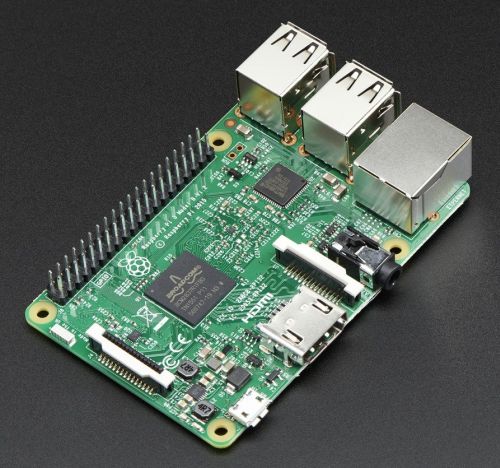
On February 29, Eben Upton announced that the Raspberry Pi was four years old, and to celebrate, the Raspberry Pi Foundation had released the Raspberry Pi 3. I grinned a little: The RPi is a Leap Year baby, and so it might conceivably be considered one year old, since we haven't had another February 29 since its initial release in 2012.
The new board (still out of stock, just checked) is almost identical in physical size and shape to the Raspberry Pi 2, and should be able to bolt into any sort of case or mount designed for the 2. That said, the new board packs a lot more horsepower:
- A new SoC: the Broadcom BCM2837
- A 1.2 GHz 64-bit quadcore RM Cortex A53 CPU.
- 802.11n Wi-Fi and Bluetooth 4.1 right on the board.
- A VideoCore IV graphics system running at 400 MHz, with the 3D core running at 300 MHz.
Most of the other specs match the RPi 2: 1 GB RAM, HDMI video capable of 1080p at 30 fps, four USB ports, a 1000BASE-T Ethernet port,composite video, and the same GPIO bus.
And still $35.
Many years ago, I think back in the VDM era, I predicted that computers would eventually become swellings along the wire between the keyboard and the screen. We're well along toward that day, but with Bluetooth on the board, there won't be a wire between the keyboard and the screen at all. In fact, there's no reason not to just bolt the computer to the back of a TV or monitor using the VESA mount holes. That's what I did with my RPi 2, and I'll use the same mount for the RPi 3, whenever it shows up. It'll basically become part of the TV, and it'll talk right to my Logitech Bluetooth keyboard/mouse.
I had another thought about mounts for the Pi: Most Dell monitors from the last ten or twelve years have a tab-mount system for amplified stereo speakers built into a bar beneath the lower edge of the screen. The bars are cheap on eBay (look for Dell part #AS501, though there may be other SKUs that snap into those same tabs) and I'm tempted to cut one open and see if I could "persuade" the bar to accept an RPi 3 board, or at least mount a board on the back of one. If I had a 3-D printer I would sketch up a snap-in Dell monitor RPi mount designed for those tabs.
One thing that many have said about the RPi 3 is that it finally has the chops to be a general purpose desktop computer. Granted, you can run a fair number of GUI productivity apps under Raspbian–and MagPi Magazine lays the mag out on an RPi (using Scribus) and has done so since inception. I managed to get the Lazarus IDE installed and running on the original Model B, though it was very sluggish and had to be installed from binary packages. Having 1 GB of memory makes many things possible, especially recompiling open-source apps for the ARM Cortex CPU. Libre Office already runs on the RPi, as do GIMP and Scribus, if slowly. (I tried both, and while they were usable, I'm kind of spoiled by 5+ years of using a quadcore Intel box.)
So what will I do with the board when I finally get one? First of all, it will replace the Pi 2 I have bolted to the back of a 23" Toshiba widescreen TV. As I did with the Pi 2, I'll install Libre Office and several other productivity and graphics apps, just to see how much faster they run.
But most eagerly, I'll be installing Lazarus 1.6. I haven't done a lot of programming over the past year because, well, I've been moving us to Phoenix. I miss it. As I've said here perhaps too often, Lazarus has made programming fun again. Sorry, C/C++ is drudgery, and Python makes whitespace significant, sheesh. (I do like TkInter.) Lazarus on the RPi 2 is nowhere near as sprightly as Lazarus on my Intel quadcore. The Pi 3 can't help but be better.
I'm strongly tempted to continue the (suspended) adaptation of my book Borland Pascal 7 From Square One for Lazarus/FreePascal, because students should be aware that C and Python are not the only damned programming languages in the world. I don't know of anything in Lazarus' class for C/C++ nor in truth any other reasonable language. There are supposedly 8 million RPi boards in the world now. 8 million. That's one helluva potential audience.
On the other hand, if I don't get some traction on a new novel pretty soon, Certain People are going to skin me.
I thought I was retired. I thought retired people were bored. I recall being bored for half an hour once, in (I think) 1967. Whatever the opposite of bored is, I am. The Raspberry Pi 3 isn't going to help with that.










